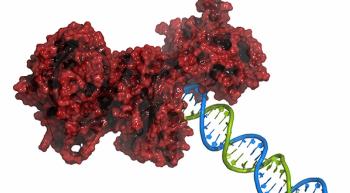
This symposium will be presented at the ONS Annual Congress in Washington, DC in May 2018, and is targeted to clinical nursing professionals in oncology.

This symposium will be presented at the ONS Annual Congress in Washington, DC in May 2018, and is targeted to clinical nursing professionals in oncology.

A free continuing education series, Marlise R. Luskin, MD, MSCE and Ilene Galinsky BSN, MSN, NP-C will present current research and case examples.

Helena A. Yu, MD, a medical oncologist at Memorial Sloan Kettering Cancer Center, explains the implications of the approval of osimertinib as the frontline standard of care for patients with EGFR-mutant non–small cell lung cancer.

A shortage of genetic counselors inspired researchers to find a way to streamline testing to prevent delays in treatment for patients with ovarian cancer who require BRCA testing.

The FDA has approved the chimeric antigen receptor (CAR) T-cell therapy tisagenlecleucel (Kymriah) for use in adult patients with relapsed/refractory large B-cell lymphoma—including diffuse large B-cell lymphoma (DLBCL), high grade B-cell lymphoma, and DLBCL arising from follicular lymphoma—after 2 or more lines of systemic therapy.

The FDA has approved the combined use of dabrafenib (Tafinlar) and trametinib (Mekinist) in the adjuvant setting for patients with BRAF V600E– or V600K–positive stage III melanoma following complete resection.

The FDA has granted a priority review to a biologics license application (BLA) for cemiplimab, a PD-1 inhibitor, for use in the treatment of patients with metastatic cutaneous squamous cell carcinoma (CSCC) or patients with locally advanced CSCC who are not eligible for surgery.

The FDA has granted a priority review for frontline use of the PD-1 inhibitor pembrolizumab (Keytruda) in combination with standard chemotherapy for patients with metastatic nonsquamous non–small cell lung cancer.

Researchers from the University of Texas MD Anderson Cancer Center in Houston, TX compared how various prostate cancer treatments compare on cost and adverse effects.

Head and neck cancer survivors have about a 45% higher suicide ratio compared to all other cancers.

One drug may have discovered a path to overcome a particularly difficult hurdle in brain cancer treatment.

Genetic testing for cancer may result in unforeseen revelations.

CancerCare study is part of greater initiative aimed at ensuring that patient engagement in decision making becomes part of the standard of care.

Nadine M. Tung, MD, discussed the role of PARP inhibitors for patients with BRCA-positive breast cancer and the importance of genetic testing.

On April 25-26, almost 2000 nurses will descend on Washington DC to fight for legislation that would establish fair nurse-to-patient ratios.

Direct-to-consumer genetic testing enables individuals to pursue testing independently and without interference from a healthcare professional. But is there a downside?

CURE magazine announces finalists for the Extraordinary Healer® Award for Oncology Nursing.

Incidences of merkel cell carcinoma, a rare skin cancer, increased 95% between 2000 and 2013, and are expected to rise further in the future due to the aging US population.

Adjuvant pembrolizumab reduced the risk of recurrence or death by 43% in patients with resected, high-risk stage III melanoma, results from phase III of the EORTC 1325-MG/KEYNOTE-054 trial showed.

BLU-667 appeared to be well-tolerated and had broad clinical benefit among patients with advanced, RET-altered solid tumors who progressed on prior therapies, according to study findings from a phase I clinical trial presented at the AACR Annual Meeting 2018.

The National Comprehensive Cancer Network (NCCN) guidelines on breast cancer now allow physicians to pinpoint the women who are most likely to benefit from post-mastectomy radiation using the latest targeted testing techniques.

The FDA has approved osimertinib (Tagrisso) for frontline use in patients with non–small cell lung cancer (NSCLC) who have EGFR-mutated tumors.

The FDA has granted priority review to a supplemental biologics license application for nivolumab (Opdivo) to be used to treat patients with small cell lung cancer who have already had two or more lines of therapy, and whose disease has continued to progress.

Significant improvements over chemotherapy alone makes frontline pembrolizumab (Keytruda) treatment a clear choice.

The FDA approved fostamatinib disodium hexahydrate (Tavalisse), an SYK inhibitor, as a second-line treatment for patients with chronic immune thrombocytopenia following insufficient response to a previous therapy.

Findings from a phase III randomized clinical trial offer new hope to some patients who have advanced myelofibrosis.

Mark J. Mann, MD, discusses the developing treatment landscape for patients with nonmetastatic castration-resistant prostate cancer.

The FDA has approved the combination of immunotherapy drugs nivolumab (Opdivo) and ipilimumab (Yervoy) as a frontline treatment for patients with advanced renal cell carcinoma (RCC).

To address the shortage of common IV fluids, many healthcare facilities are now rationing IV fluids and prioritizing their use.

Systematic exposure to bright morning light could help patients with cancer and survivors sleep better and experience less fatigue.